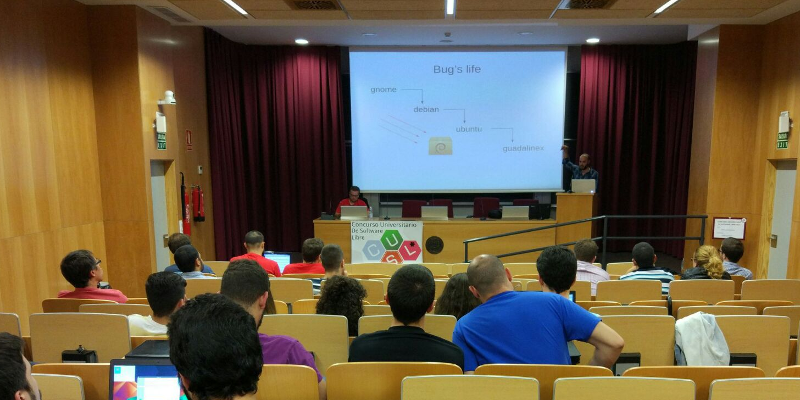Reproducible builds folks: Reproducible Builds: week 112 in Stretch cycle
Here's what happened in the Reproducible Builds effort between Sunday June 11 and Saturday June 17 2017:
Upcoming events
- On June 19th, Chris Lamb presented at LinuxCon China 2017 on Reproducible Builds.
- h01ger created a poll for a date for the next Reproducible Builds summit, please vote if you are interested in attending.
- Our next IRC meeting will be on the 6th of July at 17:00 UTC with the following agenda.
- Bernhard M. Wiedemann:
- gnuradio + volk
- pymol
- distorm
- qtscriptgenerator
- cpython
- x3270 x3270
- sphinx
- obs-service-tar_scm
- osc
- matplotlib merged
- pyparted merged
- bjoern merged
- Adrian Bunk (1)
- Edmund Grimley Evans (1)
- Chris Lamb:
- Ximin Luo:
- Add a PartialString class
- More ydiff/linediff from diffoscope. difference => diff to group unified_diff related things together
- difference: has_children -> has_visible_children, and take into account comments
- Add various traverse_ methods to Difference
- Move side-by-side and linediff algorithms to difference.py
- Refactor html-dir presenter to be a class instance, avoiding global state
- html-dir: show/hide diff comments, which can be very large
stretch was released last week. Since then, Mattia and Holger renamed our testing suite to stretch and added a buster suite so that we keep our historic results for stretch visible and can continue our development work as usual. In this sense, happy hacking on buster; may it become the best Debian release ever and hopefully the first reproducible one!
- Vagrant Cascadian:
- Proposed reducing the number of concurrent builds each armhf machine runs,
to reduce out-of-memory errors, crashes and false positives with FTBFS
on
armhf, reducing the number ofarmhfbuild workers from 70 to 51.
- Proposed reducing the number of concurrent builds each armhf machine runs,
to reduce out-of-memory errors, crashes and false positives with FTBFS
on
- Valerie Young: Add highlighting in navigation for the new nodes health pages.
- Mattia Rizzolo:
- Do not dump database ACL in the backups.
- Deduplicate
SSLCertificateFiledirective into thecommon-directives-sslmacro - Apache: t.r-b.o: redirect /testing/ to /stretch/
- db: s/testing/stretch/g
- Start adding code to test buster...
- Holger Levsen:
- Update
README.infrastructureto explain who hasrootaccess where. - reproducible_nodes_info.sh: correctly recognize zero builds per day.
- Add build nodes health overview page, then split it in three: health overview, daily munin graphs and weekly munin graphs.
- reproducible_worker.sh: improve handling of systemctl timeouts.
- reproducible_build_service: sleep less and thus restart failed workers sooner.
- Replace ftp.(de uk us).debian.org with
deb.debian.orgeverywhere. - Performance page: also show local problems with
_build_service.sh(which are autofixed after a maximum of 133.7 minutes). - Rename nodes_info job to html_nodes_info.
- Add new node health check jobs, split off from maintenance jobs, run every 15 minutes.
- Add two new checks: 1. for correct future (2019 is incorrect atm, and we sometimes got that). 2.) for writeable /tmp (sometimes happens on borked armhf nodes).
- Add jobs for testing
buster. - s/testing/stretch/g in all the code.
- Finish the code to deal with buster.
- Teach
jessieand Ubuntu 16.04 how todebootstrapbuster.
- Update



 Debian has many years of history, about 25 years already.
With such a long travel over the continous field of developing our Universal
Operating System, some myths, false accusations and bad reputation has arisen.
Today I had the opportunity to discuss this topic, I was invited to give a
Debian talk in the
Debian has many years of history, about 25 years already.
With such a long travel over the continous field of developing our Universal
Operating System, some myths, false accusations and bad reputation has arisen.
Today I had the opportunity to discuss this topic, I was invited to give a
Debian talk in the  myth #1: Debian is old software
Please, use testing or stable-backports. If you use Debian stable your system
will in fact be stable and that means: updates contain no new software but
only fixes.
myth #2: Debian is slow
We compile and build most of our packages with industry-standard compilers and
options. I don t see a significant difference on how fast linux kernel or
mysql run in a CentOS or in Debian.
myth #3: Debian is difficult
I already discussed about this issue back in
myth #1: Debian is old software
Please, use testing or stable-backports. If you use Debian stable your system
will in fact be stable and that means: updates contain no new software but
only fixes.
myth #2: Debian is slow
We compile and build most of our packages with industry-standard compilers and
options. I don t see a significant difference on how fast linux kernel or
mysql run in a CentOS or in Debian.
myth #3: Debian is difficult
I already discussed about this issue back in
 Welcome to gambaru.de. Here is my monthly report that covers what I have been doing for Debian. If you re interested in Java, Games and LTS topics, this might be interesting for you.
Debian Android
Welcome to gambaru.de. Here is my monthly report that covers what I have been doing for Debian. If you re interested in Java, Games and LTS topics, this might be interesting for you.
Debian Android

 I recently dug through my history of involvement with TeX (Live), and found out that in January there are a lot of anniversaries I should celebrate: 14 years ago I started building binaries for
I recently dug through my history of involvement with TeX (Live), and found out that in January there are a lot of anniversaries I should celebrate: 14 years ago I started building binaries for  Those of you not interested in boring and melancholic look-back onto history can safely skip reading this one. For those a bit interested in the history of TeX in Debian, please read on.
Debian releases and TeX systems
The TeX system of choice has been for long years
Those of you not interested in boring and melancholic look-back onto history can safely skip reading this one. For those a bit interested in the history of TeX in Debian, please read on.
Debian releases and TeX systems
The TeX system of choice has been for long years  Development over the years
TeX Live 2005 was just another TeX system but not the preferred one in Debian Etch and beyond. But then in May 2006, Thomas Esser announced the end of development of teTeX, which cleared the path for TeX Live as main TeX system in Debian (and the world!). The next release of Debian, Lenny (1/2009), already carried only TeX Live. Unfortunately it was only TeX Live 2007 and not 2008, mostly due to me having been involved in rewriting the upstream infrastructure based on Debian package files instead of the notorious xml files. This took quite a lot of attention and time from Debian away to upstream development, but this will be discussed in a different post.
Similarly, the release of TeX Live included in Debian Squeeze (released 2/2011) was only TeX Live 2009 (instead of 2010), but since then (Wheezy and Jessie) the releases of TeX Live in Debian were always the latest released ones.
Current status
Since about 2013 I am trying to keep a regular schedule of new TeX Live packages every month. These helps me to keep up with the changes in upstream packaging and reduces the load of packaging a new release of TeX Live. It also bring to users of unstable and testing a very up-to-date TeX system, where packages at most lack 1 month of behind the TeX Live net updates.
Future
As most of the readers here know, besides caring for TeX (Live) and related packages in Debian, I am also responsible for the TeX Live Manager (tlmgr) and most of upstream s infrastructure including network distribution. Thus, my (spare, outside work) time needs to be distributed between all these projects (and some others) which leaves less and less time for Debian packaging. Fortunately the packaging is in a state that making regular updates once a month is less of a burden, since most steps are automatized. What is still a bit of a struggle is adapting the binary package (
Development over the years
TeX Live 2005 was just another TeX system but not the preferred one in Debian Etch and beyond. But then in May 2006, Thomas Esser announced the end of development of teTeX, which cleared the path for TeX Live as main TeX system in Debian (and the world!). The next release of Debian, Lenny (1/2009), already carried only TeX Live. Unfortunately it was only TeX Live 2007 and not 2008, mostly due to me having been involved in rewriting the upstream infrastructure based on Debian package files instead of the notorious xml files. This took quite a lot of attention and time from Debian away to upstream development, but this will be discussed in a different post.
Similarly, the release of TeX Live included in Debian Squeeze (released 2/2011) was only TeX Live 2009 (instead of 2010), but since then (Wheezy and Jessie) the releases of TeX Live in Debian were always the latest released ones.
Current status
Since about 2013 I am trying to keep a regular schedule of new TeX Live packages every month. These helps me to keep up with the changes in upstream packaging and reduces the load of packaging a new release of TeX Live. It also bring to users of unstable and testing a very up-to-date TeX system, where packages at most lack 1 month of behind the TeX Live net updates.
Future
As most of the readers here know, besides caring for TeX (Live) and related packages in Debian, I am also responsible for the TeX Live Manager (tlmgr) and most of upstream s infrastructure including network distribution. Thus, my (spare, outside work) time needs to be distributed between all these projects (and some others) which leaves less and less time for Debian packaging. Fortunately the packaging is in a state that making regular updates once a month is less of a burden, since most steps are automatized. What is still a bit of a struggle is adapting the binary package ( The Independent reports that David Cameron
The Independent reports that David Cameron 
 Happy birthday
Lumicall's
Happy birthday
Lumicall's